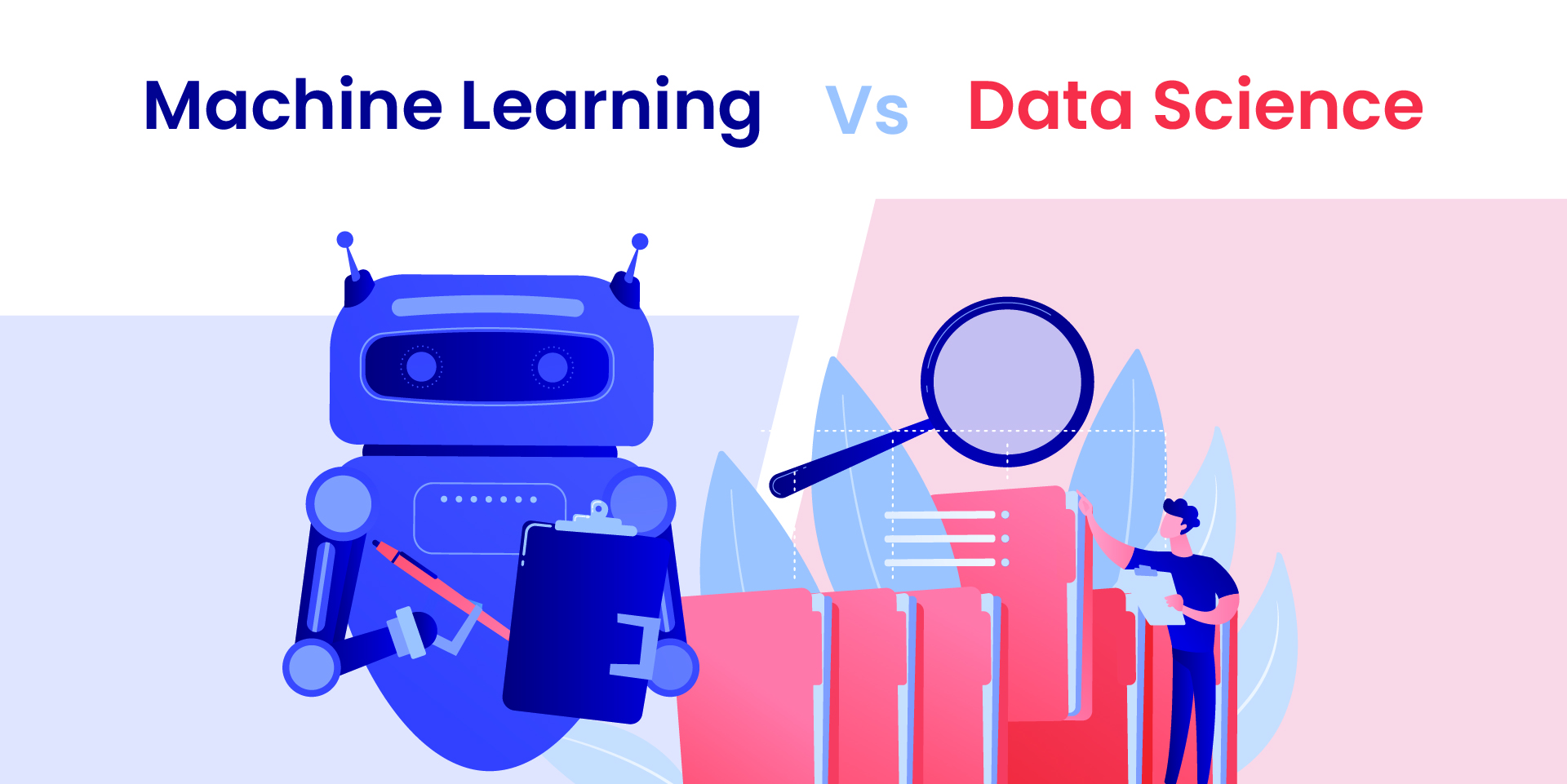When it comes to machine learning vs data science, both are two different concepts. They are also a part of the broad field known as technology. Both machine learning and data science are related to each other, just like a square and a rhombus, or a parallelogram and a rectangle. Both machine learning and data science depend on data to improve products, services, solutions, systems, decision-making processes, and much more. Data scientists use them quite often. Both of these technologies are becoming integral parts of every industry.
In the present tech-savvy and data driven world, both are preferred career choices. Pursuing a career in either data science or machine learning is rewarding. There are ample job opportunities, both within the country and overseas. For an individual looking to play an active role in the field of technology or entrepreneurs looking to focus on an AI-driven approach in their organization, understanding the difference between data science and machine learning is vital.
What is data science?
Data science is a field that involves studying data and extracting meaning from it. The data may be structured or unstructured. It makes use of various tools, systems, processes, algorithms, and a series of methods to derive key insights from data. The analysis conducted by data scientists helps them understand and answer questions like “what went wrong,” “what can happen,” “why it happened,” etc. In data science, the analysis of large volumes of data happens by combining the best practices and principles from various fields such as artificial intelligence, computer science, mathematics, and statistics. Data science knowledge and clarity assist businesses, governments, and other organizations in developing innovative products and solutions, increasing profits, developing robust infrastructure and systems, and much more.
Skills you need to make a career in data science
If you are interested in making a career in data science, here are the following skills that you will need:
- Programming knowledge with expertise in languages such as Python, R, SAS, etc.
- Knowledge of ML models and algorithms
- Working knowledge and expertise in handling massive volumes of structured and unstructured data.
- Data analysis and processing
- Data visualization and analytics
- Solid understanding of math, statistics, and probability
- Good communication skills
- Effective team collaboration
Applications of data science
Search engines
The most important and useful application of data science is search engine results. Search engines like Google depend on data science to generate search results within seconds.
Gaming
Data science is widely used in the gaming industry to enhance online gaming experiences.
Healthcare
Data science forms a key aspect of the healthcare industry, allowing medical practitioners to identify and predict disease and make personalized recommendations to patients.
Finance
The world of finance makes use of data science to analyze risk probabilities and help in fraud and risk identification.
E-commerce
Data science is being widely used by e-commerce companies to offer top-notch services to customers.
Various career options in data science
There are plenty of jobs in the data science field to choose from. These include:
- Data scientist
- Data mining engineer
- Data architect
- Data analyst
- Business Intelligence analyst
What is machine learning?
Machine learning is a branch of AI that involves using algorithms to extract useful data and predict future trends. In the ML technique, software is programmed using models that allow engineers to perform statistical analysis and understand data more effectively. Various social media platforms like YouTube, Instagram, Twitter, and Facebook leverage the information gathered, use it to predict the interests of users, and make recommendations of products or services accordingly.
By implanting ML techniques, machines and computers are able to learn without being completely programmed. Machine learning is a part of data and a subfield of AI. It enables computers to learn automatically using past data. ML is applied in data science as well. Data scientists make use of machine learning to capture more information faster and aid their teams in trend analysis.
Skills you require to build a career in machine learning
If you are interested in making a career in machine learning, here are the following skills that you will need:
- Understanding of programming languages such as R, Python, and others.
- In-depth understanding of probability and statistics
- Ability to perform data analysis and modeling
- Understanding of software engineering and systems design
- Proficiency in computer science, including algorithms, architecture, and data structure.
Applications of machine learning
Automation
ML helps automate various tasks in organizations and industries, thus saving valuable time and human efforts.
Image recognition
It entails using machine learning to detect an object in a digital image. Most image recognition systems rely on machine learning. For example, face recognition, pattern recognition, etc.
Fraud detection
Machine learning helps in online fraud detection when transactions are done online. ML models are capable of examining and identifying any unusual patterns for fraud detection.
Product recommendations
Top companies such as YouTube, Amazon, Netflix, etc. make use of ML to make product recommendations according to the needs and interests of the customer.
Autonomous vehicles
Implementing machine learning can help train the car models to detect people and objects on the road while driving.
Various career options in machine learning
There are plenty of job opportunities in the machine learning field. These include:
- Data scientist
- Machine learning engineer
- AI engineer
- Cloud engineer
- NLP scientist
- Data analyst
- Human-centered ML designer
Machine Learning vs Data Science: The Differences
Here are the major differences between data science and machine learning.
- Using data science, you can derive key insights from data dealing with all of the complex real-world situations. Machine learning enables you to predict new outcomes from historical data using various mathematical models.
- Machine learning is just one step in the entire data science process, while data science is a complete process.
- ML is a subfield of AI, while data science is not.
- Data science can deal with different types of data: raw, structured, and unstructured. Machine learning, on the other hand, operates primarily on structured data.
- In data science, the data can be read by humans. In the case of machine learning, the input data is transformed according to the type of algorithms being used.
When it comes to machine learning vs data science, the two are not synonymous. They cannot be used interchangeably. They are two different domains of technology working on different aspects. While data science analyzes data to assist businesses in understanding trends and making decisions, machine learning allows machines to self-learn and execute various tasks.


